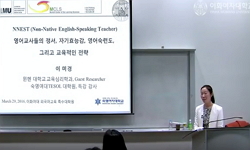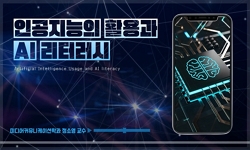This study examined the effects of creating English picture books using generative artificial intelligence (AI) on Korean high school students’ reading and writing skills, AI literacy, and self-efficacy. Forty-five students were divided into two gro...
http://chineseinput.net/에서 pinyin(병음)방식으로 중국어를 변환할 수 있습니다.
변환된 중국어를 복사하여 사용하시면 됩니다.
- 中文 을 입력하시려면 zhongwen을 입력하시고 space를누르시면됩니다.
- 北京 을 입력하시려면 beijing을 입력하시고 space를 누르시면 됩니다.
https://www.riss.kr/link?id=A109455721
- 저자
- 발행기관
- 학술지명
- 권호사항
-
발행연도
2024
-
작성언어
Korean
- 주제어
-
KDC
374
-
등재정보
KCI등재,SCOPUS
-
자료형태
학술저널
-
수록면
79-98(20쪽)
- DOI식별코드
- 제공처
-
0
상세조회 -
0
다운로드
부가정보
다국어 초록 (Multilingual Abstract)
This study examined the effects of creating English picture books using generative artificial intelligence (AI) on Korean high school students’ reading and writing skills, AI literacy, and self-efficacy. Forty-five students were divided into two groups and participated in tasks that included selecting a character from English-speaking cultures, generating images using Bing Image Creator, drafting and revising stories with ChatGPT, and creating audiobooks with ClovaDubbing. Reading and writing skills were evaluated using pre- and post-tests, and AI literacy as well as affective factors, including selfefficacy, were measured through surveys. The results indicated a significant improvement in students’ writing skills and self-efficacy, whereas reading skills did not demonstrate statistically significant progress. The study underscores the potential of generative AI as a tool for enhancing writing skills, AI literacy, and self-efficacy in language learning. However, it also emphasizes the need for further pedagogical efforts to design instructional strategies that effectively improve reading skills. These findings offer practical guidance for integrating generative AI into EFL education to enhance language learning and AI literacy.
목차 (Table of Contents)
- 1. 서론
- 2. 문헌 연구
- 2.1. 인공지능 영어교육
- 2.2. AI 리터러시
- 2.3. 영어 전기 그림책 활용수업
- 1. 서론
- 2. 문헌 연구
- 2.1. 인공지능 영어교육
- 2.2. AI 리터러시
- 2.3. 영어 전기 그림책 활용수업
- 3. 연구 방법
- 3.1. 연구 대상
- 3.2. 연구 도구
- 3.3. 연구 절차
- 3.4. 자료 수집 및 분석
- 4. 연구 결과
- 4.1. 고등학교 영어학습자의 영어 읽기 및 쓰기 능력에 미치는 영향
- 4.2. 고등학교 영어학습자의 AI 리터러시에 미치는 영향
- 4.3. 고등학교 영어학습자의 자기효능감에 미치는 영향
- 5. 결론
- REFERENCES
동일학술지(권/호) 다른 논문
-
- 한국영어교육학회
- Byungmin Lee
- 2024
- KCI등재,SCOPUS
-
From No Aid to Neural Aids: Exploring the Influence of Machine Translation on L2 Reading Problems
- 한국영어교육학회
- Gyeong Jin Park
- 2024
- KCI등재,SCOPUS
-
- 한국영어교육학회
- Kyungeun Min
- 2024
- KCI등재,SCOPUS
-
An Analysis of Inductive and Deductive Grammar Instruction in Korean University English Classes
- 한국영어교육학회
- Andrew Garth
- 2024
- KCI등재,SCOPUS






 KCI
KCI 코리아스칼라
코리아스칼라






